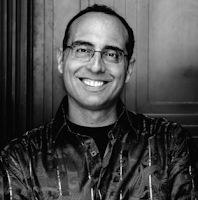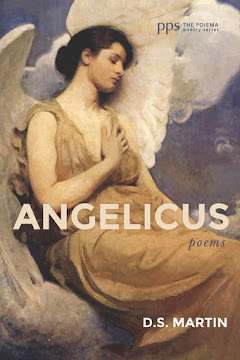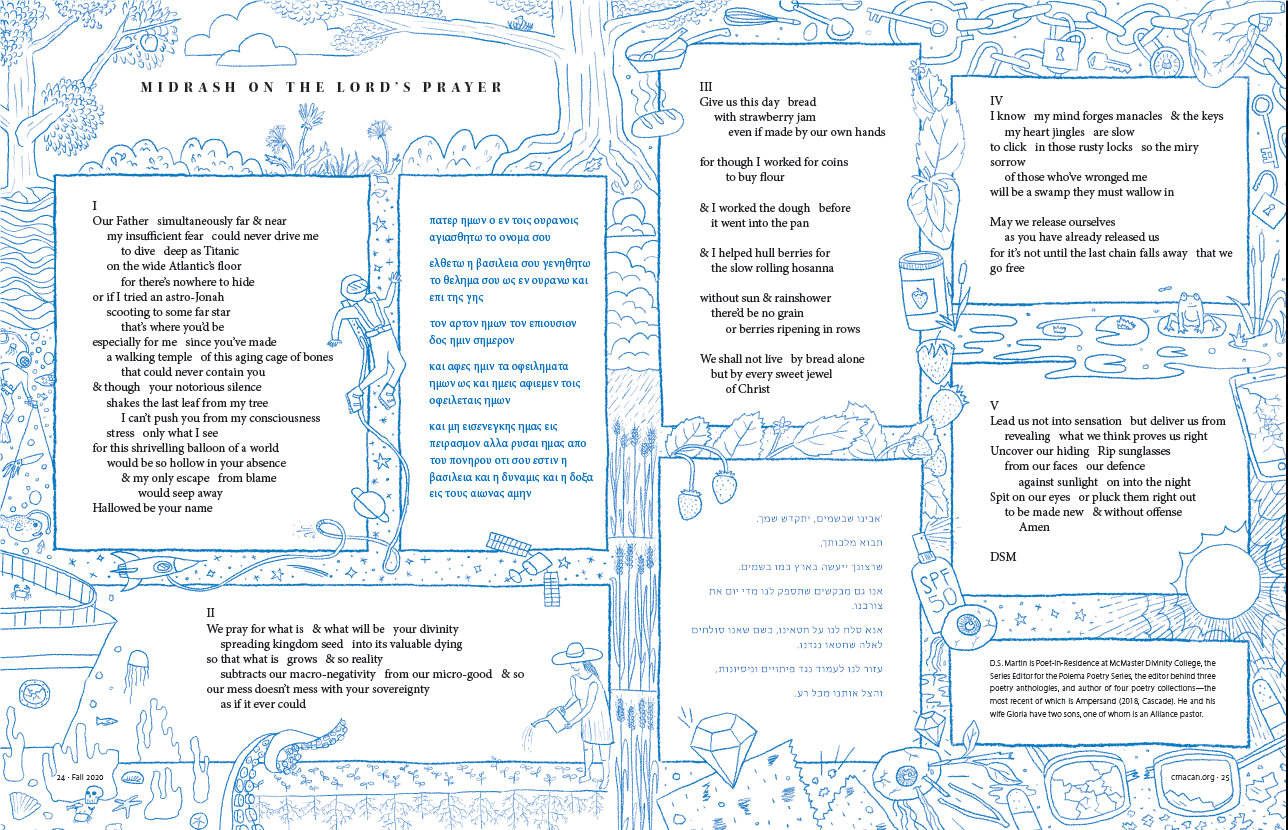Emily Brontë (1818—1848) is one of the famous sisters ― Charlotte, Emily and Anne Brontë. Their mother died when Emily was just three, and their two eldest sisters died less than four years later. Such great loss is dealt with in the poem below.
Emily’s novel Wuthering Heights (1847) has become an important focus to the Yorkshire tourism that has sprung up around the popularity of the writing of the Brontë sisters. The Parsonage where they grew up is now a museum to their honour, and St. Michael and All Angels' Church, Haworth, Yorkshire, is visited both as where their father served as Curate, and where Charlotte and Emily are buried in the family vault.
Like so many other female writers, they wrote their poetry and novels using male pseudonyms. The following poem is from Poems by Currer, Ellis, and Acton Bell. (1846, Aylott and Jones).
Encouragement
I do not weep; I would not weep;
Our mother needs no tears:
Dry thine eyes, too; ’tis vain to keep
This causeless grief for years.
What though her brow be changed and cold,
Her sweet eyes closed for ever?
What though the stone—the darksome mould
Our mortal bodies sever?
What though her hand smooth ne’er again
Those silken locks of thine?
Nor, through long hours of future pain,
Her kind face o’er thee shine?
Remember still, she is not dead;
She sees us, sister, now;
Laid, where her angel spirit fled,
’Mid heath and frozen snow.
And from that world of heavenly light
Will she not always bend
To guide us in our lifetime’s night,
And guard us to the end?
Thou knowest she will; and thou mayst mourn
That WE are left below:
But not that she can ne’er return
To share our earthly woe.
*This is the second Kingdom Poets post about Emily Brontë: first post.
Entry written by D.S. Martin. He is the author of five poetry collections including Angelicus (2021, Cascade) ― a book of poems written from the point-of-view of angels. His books are available through Wipf & Stock.
Monday, January 31, 2022
Monday, January 24, 2022
John Taylor
John Taylor (1578―1653) is an English poet who spent much of his life as a Thames waterman ― that is, someone who taxied people back and forth across the river in London when London Bridge was the only other way to get across. In this role he would have had interactions with London literary society, ferrying patrons, actors, and playwrights across the Thames to the Bankside theatres.
He creatively embarked on risky ventures for the sake of publication, such as travelling to Scotland without any money in 1618 for Pennylesse Pilgrimage, or travelling down the Thames in a paper boat. He has been described as “a cavalier and staunch Anglican with a puritanical taste for sermons…” He also wrote official reports in his role as clerk in the guild of Thames boatmen. Much is known about this side of working class London only because Taylor wrote about it.
Because he was self-educated Taylor had trouble being accepted by the literary elite. Even so, he wrote extensively, often having his work published for subscribers who contributed in advance. He gave himself the title “The Water Poet” as he carved out a niche for himself. Not only as a waterman, but figuratively speaking as a writer, he crossed back and forth from one side of London society to the other.
His poems and pamphlets were collected and published in 1630 as All the Workes of John Taylor the Water Poet. He is buried at the church of St Martin-in-the-Fields.
(In Taylor’s poem, below, he shares a mis-reading of the biblical account of Babel common in his day and ― in the section following what I’ve included ― a, perhaps deliberate, misunderstanding of which languages existed in ancient times.)
from 'The Several Sieges, Assaults, Sackings, And Final Destruction Of The Famous, Ancient, And Memorable City Of Jerusalem.'
The Justice, Mercy, and the Might, I sing,
Of heaven’s just, merciful, Almighty King;
By whose fore-knowledge all things were elected,
Whose power hath all things made & al protected,
Whose mercies' flood hath quenched his justice flame,
Who was, is, shall be one, and still the same
Who in the prime, when all things first began,
Made all for man, and for himself made man,
Made, not begotten, or of humane birth,
No sire but God, no mother but the earth;
Who ne'r knew childhood, or the sucking teat,
But at the first was made man complete;
Whose inward soul in God-like form did shine,
As image of the Majesty Divine;
Whose supernatural wisdom (beyond nature)
Did name each sensible and senseless creature,
And from whose star-like, sand-like generation
Sprung every kindred, kingdom, tribe, and nation.
All people then one language spake alone,
Interpreters the world then needed none;
There lived then no learned deep grammarians,
There were no Turks, no Scythians, no Tartarians
Then all was one, and one was only all
The language of the universal ball.
Then if a traveller had gone as far
As from the Arctic to th' Antarctic star,
If he from Boreas unto Auster went,
Or from the Orient to th' Occident,
Which way soever he did turn or wind,
He had been sure his country-man to find.
One hundred thirty winters since the flood
The earth one only language understood;
Until the son of Cush, the son of Cham,
A proud, cloud-scaling tower began to frame,
Trusting that if the world again were drowned,
He in his lofty building might rest sound;
All future floods he purposed to prevent,
Aspiring to heaven’s glorious battlement.
But high Jehovah with a puff was able
To make ambitious Babel but a bable,
(For what is man, that he should dare resist
The great Almighty's power, who in his fist
Doth gripe eternity, and, when he please,
Can make and unmake heaven and earth & seas?)
For in their expectation of conclusion
He plagued them all with sundry tongues' confusion.
Such gibberish, gibble-gabble, all did jangle,
Some laugh, some fret, all prate, all different wrangle…
Entry written by D.S. Martin. He is the author of five poetry collections including Angelicus (2021, Cascade) ― a book of poems written from the point-of-view of angels. His books are available through Wipf & Stock.
He creatively embarked on risky ventures for the sake of publication, such as travelling to Scotland without any money in 1618 for Pennylesse Pilgrimage, or travelling down the Thames in a paper boat. He has been described as “a cavalier and staunch Anglican with a puritanical taste for sermons…” He also wrote official reports in his role as clerk in the guild of Thames boatmen. Much is known about this side of working class London only because Taylor wrote about it.
Because he was self-educated Taylor had trouble being accepted by the literary elite. Even so, he wrote extensively, often having his work published for subscribers who contributed in advance. He gave himself the title “The Water Poet” as he carved out a niche for himself. Not only as a waterman, but figuratively speaking as a writer, he crossed back and forth from one side of London society to the other.
His poems and pamphlets were collected and published in 1630 as All the Workes of John Taylor the Water Poet. He is buried at the church of St Martin-in-the-Fields.
(In Taylor’s poem, below, he shares a mis-reading of the biblical account of Babel common in his day and ― in the section following what I’ve included ― a, perhaps deliberate, misunderstanding of which languages existed in ancient times.)
from 'The Several Sieges, Assaults, Sackings, And Final Destruction Of The Famous, Ancient, And Memorable City Of Jerusalem.'
The Justice, Mercy, and the Might, I sing,
Of heaven’s just, merciful, Almighty King;
By whose fore-knowledge all things were elected,
Whose power hath all things made & al protected,
Whose mercies' flood hath quenched his justice flame,
Who was, is, shall be one, and still the same
Who in the prime, when all things first began,
Made all for man, and for himself made man,
Made, not begotten, or of humane birth,
No sire but God, no mother but the earth;
Who ne'r knew childhood, or the sucking teat,
But at the first was made man complete;
Whose inward soul in God-like form did shine,
As image of the Majesty Divine;
Whose supernatural wisdom (beyond nature)
Did name each sensible and senseless creature,
And from whose star-like, sand-like generation
Sprung every kindred, kingdom, tribe, and nation.
All people then one language spake alone,
Interpreters the world then needed none;
There lived then no learned deep grammarians,
There were no Turks, no Scythians, no Tartarians
Then all was one, and one was only all
The language of the universal ball.
Then if a traveller had gone as far
As from the Arctic to th' Antarctic star,
If he from Boreas unto Auster went,
Or from the Orient to th' Occident,
Which way soever he did turn or wind,
He had been sure his country-man to find.
One hundred thirty winters since the flood
The earth one only language understood;
Until the son of Cush, the son of Cham,
A proud, cloud-scaling tower began to frame,
Trusting that if the world again were drowned,
He in his lofty building might rest sound;
All future floods he purposed to prevent,
Aspiring to heaven’s glorious battlement.
But high Jehovah with a puff was able
To make ambitious Babel but a bable,
(For what is man, that he should dare resist
The great Almighty's power, who in his fist
Doth gripe eternity, and, when he please,
Can make and unmake heaven and earth & seas?)
For in their expectation of conclusion
He plagued them all with sundry tongues' confusion.
Such gibberish, gibble-gabble, all did jangle,
Some laugh, some fret, all prate, all different wrangle…
Entry written by D.S. Martin. He is the author of five poetry collections including Angelicus (2021, Cascade) ― a book of poems written from the point-of-view of angels. His books are available through Wipf & Stock.
Monday, January 17, 2022
Philip Metres
Philip Metres is an American poet of Lebanese descent who is active in the Arab-American literary scene. He is a professor of English and Director of the Peace, Justice, and Human Rights program at John Carroll University in Cleveland, Ohio.
America magazine has composed a video about Metres and his work, (available on his website) where the poet quotes the phrase in Isaiah 50 ― “The Lord God has given me a well-trained tongue that I might speak to the weary a word that will rouse them.” He then continues, “When I read that I thought that’s what I want to do…that’s…the mission...of being a writer...to wake us up to the mystery and miracle of what it means to be alive.”
The most recent of his five poetry collections is Shrapnel Maps (2020, Copper Canyon). He has also translated book-length collections by Russian poets Arseny Tarkovsky, Lev Rubinstein and Sergey Gandlevsky. The following poem first appeared in Poetry magazine, and is from his collection Sand Opera (2015, Alice James).
Compline
That we await a blessed hope, & that we will be struck
With great fear, like a baby taken into the night, that every boot,
Every improvised explosive, Talon & Hornet, Molotov
& rubber-coated bullet, every unexploded cluster bomblet,
Every Kevlar & suicide vest & unpiloted drone raining fire
On wedding parties will be burned as fuel in the dark season.
That we will learn the awful hunger of God, the nerve-fraying
Cry of God, the curdy vomit of God, the soiled swaddle of God,
The constant wakefulness of God, alongside the sweet scalp
Of God, the contented murmur of God, the limb-twitched dream-
Reaching of God. We’re dizzy in every departure, limb-lost.
We cannot sleep in the wake of God, & God will not sleep
The infant dream for long. We lift the blinds, look out into ink
For light. My God, my God, open the spine binding our sight.
Posted with permission of the poet.
This post was suggested by my friend Brad Davis.
Entry written by D.S. Martin. He is the author of five poetry collections including Angelicus (2021, Cascade) ― a book of poems written from the point-of-view of angels. His books are available through Wipf & Stock.
America magazine has composed a video about Metres and his work, (available on his website) where the poet quotes the phrase in Isaiah 50 ― “The Lord God has given me a well-trained tongue that I might speak to the weary a word that will rouse them.” He then continues, “When I read that I thought that’s what I want to do…that’s…the mission...of being a writer...to wake us up to the mystery and miracle of what it means to be alive.”
The most recent of his five poetry collections is Shrapnel Maps (2020, Copper Canyon). He has also translated book-length collections by Russian poets Arseny Tarkovsky, Lev Rubinstein and Sergey Gandlevsky. The following poem first appeared in Poetry magazine, and is from his collection Sand Opera (2015, Alice James).
Compline
That we await a blessed hope, & that we will be struck
With great fear, like a baby taken into the night, that every boot,
Every improvised explosive, Talon & Hornet, Molotov
& rubber-coated bullet, every unexploded cluster bomblet,
Every Kevlar & suicide vest & unpiloted drone raining fire
On wedding parties will be burned as fuel in the dark season.
That we will learn the awful hunger of God, the nerve-fraying
Cry of God, the curdy vomit of God, the soiled swaddle of God,
The constant wakefulness of God, alongside the sweet scalp
Of God, the contented murmur of God, the limb-twitched dream-
Reaching of God. We’re dizzy in every departure, limb-lost.
We cannot sleep in the wake of God, & God will not sleep
The infant dream for long. We lift the blinds, look out into ink
For light. My God, my God, open the spine binding our sight.
Posted with permission of the poet.
This post was suggested by my friend Brad Davis.
Entry written by D.S. Martin. He is the author of five poetry collections including Angelicus (2021, Cascade) ― a book of poems written from the point-of-view of angels. His books are available through Wipf & Stock.
Monday, January 10, 2022
Maryann Corbett
Maryann Corbett is a Saint Paul, Minnesota Poet who grew up in northern Virginia. She earned her doctorate from the University of Minnesota, and worked for more than thirty years as a language specialist for the Minnesota legislature. Corbett has authored five full-length poetry books: the most recent being In Code (2020, Able Muse). Her third book received the Richard Wilbur Award, which honours metrical poetry.
The following poem was first published in First Things, has also appeared at Versedaily, and is from her book Mid Evil (2014, University of Evansville Press).
Prophesying to the Breath
I'm tired of it, this labored breathing. Tired
of phlegm and coughing and the fight for air,
bent double on the landing of a stair,
in wheezing gasps where nothing is inspired.
Tired of the silence next to me in bed
when measured snoring suddenly goes still;
of counting a nervous one, two, three until
it starts itself again. Tired of my dread.
I want it back: the confidence in air—
ruah, pneuma, spiritus—the breath
that stirs the vocal folds of nuns in choir.
The breath that Is. The sound of something there
guiding this gusty round of birth and death.
The rush of driving wind. The tongues of fire.
This post was suggested by my friend Burl Horniachek.
Entry written by D.S. Martin. He is the author of five poetry collections including Angelicus (2021, Cascade) ― a book of poems written from the point-of-view of angels. His books are available through Amazon, and Wipf & Stock.
The following poem was first published in First Things, has also appeared at Versedaily, and is from her book Mid Evil (2014, University of Evansville Press).
Prophesying to the Breath
I'm tired of it, this labored breathing. Tired
of phlegm and coughing and the fight for air,
bent double on the landing of a stair,
in wheezing gasps where nothing is inspired.
Tired of the silence next to me in bed
when measured snoring suddenly goes still;
of counting a nervous one, two, three until
it starts itself again. Tired of my dread.
I want it back: the confidence in air—
ruah, pneuma, spiritus—the breath
that stirs the vocal folds of nuns in choir.
The breath that Is. The sound of something there
guiding this gusty round of birth and death.
The rush of driving wind. The tongues of fire.
This post was suggested by my friend Burl Horniachek.
Entry written by D.S. Martin. He is the author of five poetry collections including Angelicus (2021, Cascade) ― a book of poems written from the point-of-view of angels. His books are available through Amazon, and Wipf & Stock.
Monday, January 3, 2022
T.S. Eliot*
T.S. Eliot (1888—1965) is one of the most influential poets of the twentieth century. He was born in St. Louis, Missouri, to a prominent New England family of Unitarians. His education carried him to Harvard, to Paris, and then to Oxford. In 1927 he became a British citizen and joined the Anglican Church. He eventually became the literary editor for Faber & Faber, and after that he became one of the publishing house’s directors.
According to the website for the Nobel Prize in Literature — which Eliot won in 1948 — “Eliot’s poetry from Prufrock (1917) to the Four Quartets (1943) reflects the development of a Christian writer: the early work, especially The Waste Land (1922), is essentially negative, the expression of that horror from which the search for a higher world arises. In Ash Wednesday (1930) and the Four Quartets this higher world becomes more visible…”
In an interview in the Paris Review in 1959, Eliot said he believed his poem the Four Quartets was his best work, and that each succeeding section is better than the one before. “At any rate, that’s the way I flatter myself.”
T.S. Eliot died on January 4, 1965.
The Journey Of The Magi
A cold coming we had of it,
Just the worst time of the year
For a journey, and such a long journey:
The ways deep and the weather sharp,
The very dead of winter.'
And the camels galled, sorefooted, refractory,
Lying down in the melting snow.
There were times we regretted
The summer palaces on slopes, the terraces,
And the silken girls bringing sherbet.
Then the camel men cursing and grumbling
and running away, and wanting their liquor and women,
And the night-fires going out, and the lack of shelters,
And the cities hostile and the towns unfriendly
And the villages dirty and charging high prices:
A hard time we had of it.
At the end we preferred to travel all night,
Sleeping in snatches,
With the voices singing in our ears, saying
That this was all folly.
Then at dawn we came down to a temperate valley,
Wet, below the snow line, smelling of vegetation;
With a running stream and a water-mill beating the darkness,
And three trees on the low sky,
And an old white horse galloped away in the meadow.
Then we came to a tavern with vine-leaves over the lintel,
Six hands at an open door dicing for pieces of silver,
And feet kicking the empty wine-skins.
But there was no information, and so we continued
And arriving at evening, not a moment too soon
Finding the place; it was (you might say) satisfactory.
All this was a long time ago, I remember,
And I would do it again, but set down
This set down
This: were we led all that way for
Birth or Death? There was a Birth, certainly
We had evidence and no doubt. I had seen birth and death,
But had thought they were different; this Birth was
Hard and bitter agony for us, like Death, our death.
We returned to our places, these Kingdoms,
But no longer at ease here, in the old dispensation,
With an alien people clutching their gods.
I should be glad of another death.
*This is the fourth Kingdom Poets post about T.S. Eliot: first post, second post, third post.
Entry written by D.S. Martin. He is the author of five poetry collections including Angelicus (2021, Cascade) ― a book of poems written from the point-of-view of angels. His books are available through Amazon, and Wipf & Stock.
According to the website for the Nobel Prize in Literature — which Eliot won in 1948 — “Eliot’s poetry from Prufrock (1917) to the Four Quartets (1943) reflects the development of a Christian writer: the early work, especially The Waste Land (1922), is essentially negative, the expression of that horror from which the search for a higher world arises. In Ash Wednesday (1930) and the Four Quartets this higher world becomes more visible…”
In an interview in the Paris Review in 1959, Eliot said he believed his poem the Four Quartets was his best work, and that each succeeding section is better than the one before. “At any rate, that’s the way I flatter myself.”
T.S. Eliot died on January 4, 1965.
The Journey Of The Magi
A cold coming we had of it,
Just the worst time of the year
For a journey, and such a long journey:
The ways deep and the weather sharp,
The very dead of winter.'
And the camels galled, sorefooted, refractory,
Lying down in the melting snow.
There were times we regretted
The summer palaces on slopes, the terraces,
And the silken girls bringing sherbet.
Then the camel men cursing and grumbling
and running away, and wanting their liquor and women,
And the night-fires going out, and the lack of shelters,
And the cities hostile and the towns unfriendly
And the villages dirty and charging high prices:
A hard time we had of it.
At the end we preferred to travel all night,
Sleeping in snatches,
With the voices singing in our ears, saying
That this was all folly.
Then at dawn we came down to a temperate valley,
Wet, below the snow line, smelling of vegetation;
With a running stream and a water-mill beating the darkness,
And three trees on the low sky,
And an old white horse galloped away in the meadow.
Then we came to a tavern with vine-leaves over the lintel,
Six hands at an open door dicing for pieces of silver,
And feet kicking the empty wine-skins.
But there was no information, and so we continued
And arriving at evening, not a moment too soon
Finding the place; it was (you might say) satisfactory.
All this was a long time ago, I remember,
And I would do it again, but set down
This set down
This: were we led all that way for
Birth or Death? There was a Birth, certainly
We had evidence and no doubt. I had seen birth and death,
But had thought they were different; this Birth was
Hard and bitter agony for us, like Death, our death.
We returned to our places, these Kingdoms,
But no longer at ease here, in the old dispensation,
With an alien people clutching their gods.
I should be glad of another death.
*This is the fourth Kingdom Poets post about T.S. Eliot: first post, second post, third post.
Entry written by D.S. Martin. He is the author of five poetry collections including Angelicus (2021, Cascade) ― a book of poems written from the point-of-view of angels. His books are available through Amazon, and Wipf & Stock.
Subscribe to:
Posts (Atom)























